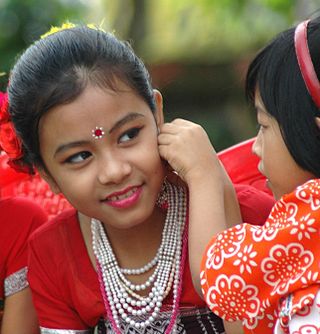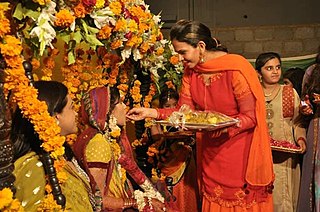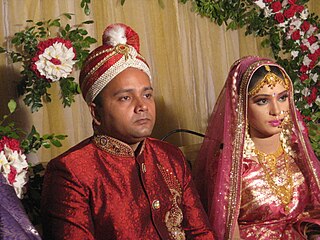
Bandar Torkaman, formerly known as Bandar Shah, is a city and capital of Torkaman County, Golestan Province, Iran. At the 2006 census its population was 45,045, in 9,755 families.
A Hindu wedding, also known as Vivaha, Marathi: Lagna (लग्न), Bengali: Bibaho (বিবাহ) Kalyanam or Pelli, is the traditional wedding ceremony for Hindus. The wedding ceremonies are very colourful, and celebrations may extend for several days. The bride's and groom's home—entrance, doors, wall, floor, roof—are sometimes decorated with colors, flowers, and other decorations.

The Tripuri culture of North-East India has many distinctive features.
Nador (ನಾಡೋರ) or Nadavaru or Nadavar (ನಾಡವರ) is the name of a caste from Karnataka, India. Members of the castle are found primarily in the coastal areas of Uttara Kannada district, formerly known as North Canara, with many members also spread throughout the world. Caste members traditionally speak the Nadavar dialect of Kannada called Nadavar Kannada. They are a prominent agriculture community of the Uttara Kannada district of Karnataka, India.

A Bengali Muslim wedding is a Bengali wedding which includes very few rituals and ceremonies that may span up to three days max. In most cases, it starts with the Paka Dekha ceremony. Then, nikkah which is done by a kaji with a fixed denmohor and it ends with the Bou Bhat ceremony that is popular as the wedding reception arranged by the groom's family.
Iranian wedding, also known as Persian wedding, consists of traditions that go back to Zoroastrianism, which was the main religion of pre-Islamic Iran, and although the concepts theories of marriage have been changed by Islamic traditions, the ceremonies have remained more or less the same as they were originally in pre-Islamic Iran. Although modern-day Iran is a multi-ethnic country, Iranian wedding traditions are observed by the majority of ethnic groups in Iran.

Marriage in Pakistan pertains to wedding traditions established and adhered by Pakistani men and women. Despite their local and regional variations, marriages in Pakistan generally follow Islamic marital jurisprudence. Marriages are not only seen as a union between a husband and a wife, but also an alliance between their respective families. These traditions extend to other countries around in the world where Overseas Pakistani communities exist.

Punjabi wedding traditions are a strong reflection of Punjabi culture with ritual, song, dance, food, and dress that have evolved over centuries.
A Brunei Malay wedding has many types of ceremonies.

The Kisan or nagesia are a tribal group found in Odisha, West Bengal and Jharkhand. They are traditional farmers and a food gathering people. They speak Kisan, a dialect of Kurukh, as well as Odia and Sambalpuri. The tribe mainly lives in northwestern Odisha, in the districts of Sundergarh, Jharsuguda and Sambalpur. Other populations live in Malda district in western West Bengal and Latehar and Gumla districts of western Jharkhand. They also reside in Nepal's Jhapa district in small number(around 1000)
The pounded rice ritual normally occurs with an arranged marriage occurring in Southeast Asia.

[[File:Mala Badal - Hindu Wedding - Howrah 2015-12-06 7716.JPG|thumb|Mala Badal - Bengali Hindu Wedding]]
A Poruwa ceremony is a traditional Sinhalese wedding ceremony. The ceremony takes place on a "Poruwa", a beautifully decorated, traditional wooden platform. The ceremony involves a series of rituals performed by the bride and groom, and their families.

Muslim marriage and Islamic wedding customs are traditions and practices that relate to wedding ceremonies and marriage rituals prevailing within the Muslim world. Although Islamic marriage customs and relations vary depending on country of origin and government regulations, both Muslim men and women from around the world are guided by Islamic laws and practices specified in the Quran. Islamic marital jurisprudence allows Muslim men to be married to multiple women.
The Telugu Hindu wedding ceremony is the traditional wedding ceremony of the Telugu people in India. In the 19th century, the ceremony could last up to sixteen days. In modern times, it can last two or more days, depending on the family's financial and social status. The pelli or wedding is considered the strongest of social bonds, and is said to spiritually merge two souls opening the doors to gruhastaashramam. There is a Telugu saying that "Marriage is supposed to be a family union and not an individual formality." However, with changing mindset of the younger generation and due to globalization, marriage these days is being mainly focused solely on the union of the young couple only.
Bahaghara is a wedding ceremony performed by Odia Hindu people in the Indian state of Odisha. There are subtle differences in the rites observed by different castes. In Odia marriage rituals, the mother of the bridegroom does not take part in the ceremony. The Utkala Brahmins have their weddings only in the daytime, preferably at midday or in the morning, while the other caste weddings are done during the evening or night. There is the custom of sending betel nuts to family friends for inviting them to the marriage. The first invitation is sent to the family deity as a respect to the lord. Marriages in Odisha are mostly fixed and arranged by the parents. Marriages for serving or capturing is not common.
Wedding customs in Ethiopia vary among the diverse tribes of the country, and are among the most important expressions of each tribe's culture.
Kanwar or Kawar is a tribal community found in central India, mainly in the state of Chhattisgarh, with significant populations in neighbouring areas of Maharashtra and Madhya Pradesh.
Sindhi traditions and rituals. Sindhi people have many traditions and rituals starting from the birth of a child to its death. These traditions and rituals differ from region to region and also from one religion to another.









